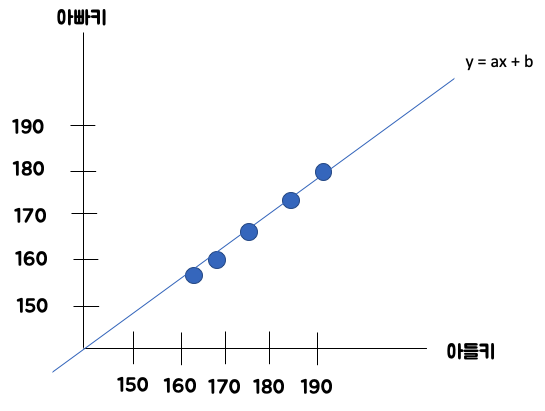저희가 예전에 수학을 배울 때 저 선을 y = ax + b라고 했었는데

저희는 지금 이 선을 Wx + b라고 하겠습니다.

import tensorflow as tf
print(tf.__version__)
# 텐서플로우 버전 확인
# 만약 1.x가 나오면 아래의 코드 실행
# !pip uninstall tensorflow --yes
# !pip install tensorflow==2.0.0
import numpy as np
rng = np.random
# 파라메터 설정
learning_rate = 0.01
training_steps = 1000
display_step = 50
# 학습
X = np.array([1,2,3,4])
Y = np.array([1,2,3,4])
n_samples = X.shape[0]
# W b 설정
W = tf.Variable(rng.randn(), name="weight")
b = tf.Variable(rng.randn(), name="bias")
# Linear regression (Wx + b).
def linear_regression(x):
return W * x + b
# 선에 주황색 줄들
def mean_square(y_pred, y_true):
return tf.reduce_sum(tf.pow(y_pred-y_true, 2)) / (2 * n_samples)
# 경사하강법 적용
optimizer = tf.optimizers.SGD(learning_rate)
# optimizer
def run_optimization():
# Wrap computation inside a GradientTape for automatic differentiation.
with tf.GradientTape() as g:
pred = linear_regression(X)
loss = mean_square(pred, Y)
gradients = g.gradient(loss, [W, b])
optimizer.apply_gradients(zip(gradients, [W, b]))
# 학습 gogo
for step in range(1, training_steps + 1):
# Run the optimization to update W and b values.
run_optimization()
if step % display_step == 0:
pred = linear_regression(X)
loss = mean_square(pred, Y)
print("step: %i, loss: %f, W: %f, b: %f" % (step, loss, W.numpy(), b.numpy()))
import matplotlib.pyplot as plt
# 시각화
plt.plot(X, Y, 'ro', label='Original data')
plt.plot(X, np.array(W * X + b), label='Fitted line')
plt.legend()
plt.show()
# 코드참조
# https://github.com/aymericdamien/TensorFlow-Examples/blob/master/tensorflow_v2/notebooks/2_BasicModels/linear_regression.ipynb
# 텐서플로우 버전 바꾸기
# !pip uninstall tensorflow --yes
# !pip install tensorflow==2.0.0
import tensorflow as tf
print(tf.__version__)
import numpy as np
x_train = [1,2,3,4]
y_train = [1.5,3,4.5,6]
model = tf.keras.models.Sequential()
model.add(tf.keras.layers.Dense(1, input_dim = 1))
sgd = tf.keras.optimizers.SGD(lr=0.01)
model.compile(loss="mean_squared_error", optimizer=sgd)
model.fit(x_train, y_train, epochs=1000)
print(model.predict(np.array([4])))
# 코드참조
# https://www.youtube.com/watch?v=YT2Uy5x3gaA
'인프런 - 강의 > 나도 만들어본다 AI 앱 (tensorflow+android)' 카테고리의 다른 글
| 7 - 간단한 딥러닝 구현 (0) | 2020.03.05 |
|---|---|
| 6 - 그러면 deep러닝은 뭔가요? (0) | 2020.03.03 |
| 4 - 정말 간단한 Linear regression 이론 (0) | 2020.03.03 |
| 3 - AI란 무엇인가? (0) | 2020.03.03 |
| 2 - 개발환경 세팅하기 (0) | 2020.03.03 |